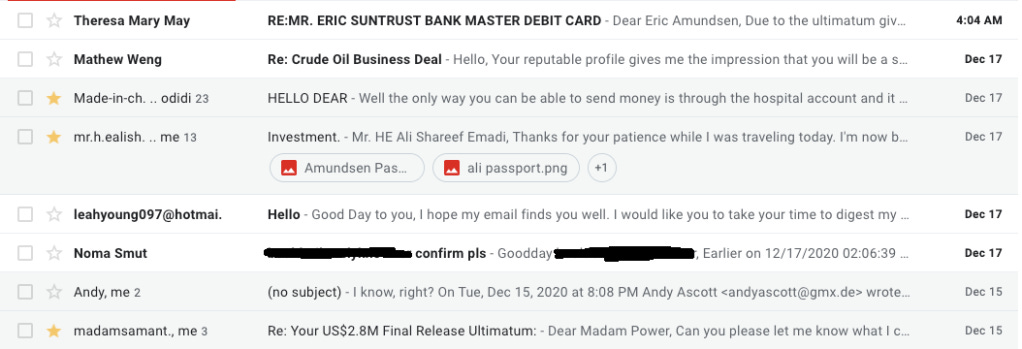'Tis the Season for... Method Writing?!
We can't always live, step-by-step, a day in the life of our characters, but method writing helps us *breathe* life into our characters.
Brando. Streep. Pacino.
These are names I found on a list of method actors.
Underwhelmed? I know, but the point here isn't to explore the particulars of any actor's career. Instead, it's to embrace the idea of method acting—or living the role one's to play—in the realm of writing.
Granted, we can't always live, step-by-step, a day in the life of our characters in order to understand them, their world, and their experiences to better fuel our writing. I hate to break it to you: no matter how hard you try, you're not going to become a dragon.
No matter how hard you try, you're not going to become a dragon.
We may not be able to sprout wings, breathe fire, and hoard treasure, but there are little things we can do to breathe life into our characters.
And I would know: last week, I leaned in hard to a day in the life of the protagonist of my work in progress, Scambait.
Call Me Eric
Eric Amundsen, Scambait's protagonist, is a corporate layabout who's obsessed with the contents of his spam folder. In what most find an annoyance, Eric finds his calling: the more time he spends stringing scammers along, the less time the scammers have to swindle the unsuspecting.
As recent posts will suggest, I've been keen to this scambaiting thing for a while, but this last week, for the first time, I thought I'd try it out myself. You know, let's see what happens when you start actually responding to the contents of your spam folder. That kind of thing.
The results have been, shall we say, fascinating. They've been hilarious.
They've also been critical for developing a more nuanced understanding of my protagonist.
But first, a word of warning: don't just start doing this yourself without first taking the proper precautions.
I'll explore some of the precautions I had to take before engaging the folks in my spam folder below, but this will be a non-exhaustive list. Replying to these emails, downloading their attachments, or otherwise providing them with certain kinds of information can put you and your computer at risk, so, again: do not just start doing this willy nilly.
Method, Step One: Gearing Up
If I were to live the day of a scambaiter, I'd have to think like a scambaiter. This, ironically enough, meant thinking like a scammer, too.
What would a scammer want from me, for example? Well, there's the obvious personal identifying information (social security, address, phone number, bank account information, etc.), but there's also the less obvious like IP address, access to my email and social media accounts, and any files of note on my hard drives.
My first steps to better getting to know Eric included:
creating separate email accounts (plural!) specifically for scambaiting
populating those accounts with personal information, including (stock) photos
purchasing and activating a virtual private network (VPN)
signing up to receive spam emails
The last of these, signing up for spam, may raise some brows, but trust me: it has to be done. When you create a fresh email account—particularly when it's one that isn't a very common name at gmail, yahoo, or hotmail.com, for example—you'll get nothing but crickets in your inbox unless you go forth and welcome in the spam.
There are sites that will sign up an email address for nefarious or less trustworthy distribution lists (no, I won't share their names here; besides, it's illegal harassment to do what you're thinking you want to do to that old boss or ex of yours). Once I found those sites, I signed up the (multiple!) email accounts I created for Eric, and then, I waited for the spam to come rolling in.
I didn't have to wait long.
Method, Step Two: The Baiting Begins
Patience, they say, is a virtue, but who needs patience when dozens of eager scammers are just dying to hear from you? Take a peek at just one of my scambait inboxes only three days after signing up for these lists.
And these are just active scambaits on this one account. By this I mean these are ongoing conversations, or ones I still think I've got a shot at keeping moving through various means.
Some of my favorite moments thus far have included:
Multiple emails from former British Prime Minister, Theresa May
An ongoing conversation with Odidi, who would very much like to marry me, but must first care for her ailing grandmother, whose healthcare she really needs me to pay for
My pitching a Qatari oil magnate on investing in an amusement park for cats
The introduction email I received that simply reads "me too"
It's a joy, really, to keep giving these people just enough hope that they might get something from me, all the while getting increasingly more absurd in my replies.
It's also really damn hard to keep up with.
Method, Step Three: The Distillation
If you're eager for the particulars of these scambaits, you'll get them eventually in video form on my (at this time, slightly outdated) YouTube channel, and I may occasionally read some of them live on Instagram like I did earlier this week.
What's important for this conversation are the takeaways from my early scambait misadventures and how they've helped me better understand my protagonist.
My three biggest takeaways from my first week of scambaiting are that it's a lot of work, an extraordinary thrill, and a surefire way to induce a heavy dose of paranoia into your day-to-day life.
Who knew fun could be so much hard work?
It took me the better part of a Monday morning and a chunk of the preceding Sunday to get everything set up to scambait safely (or as safely as I can manage on my budget). These are hours I could have spent reading and writing (or, let's be honest, playing Hyrule Warriors: Age of Calamity) that I instead passed by gearing up for something with an uncertain payoff.
Part of that payoff has proven to include, however, an appreciation for how challenging it is to strike a balance between keeping the scambaiting fun (by slowly messing with the scammer more and more) while also keeping them engaged in the conversation. There's an art to this, really, and it's one I'm only beginning to understand.
For my manuscript, these takeaways mean I can now better embrace the pride that my protagonist feels when he pulls off a successful scambait, as well as the sense of inadequacy he feels in the presence of the big-time scambaiters who do this stuff not by email, but by phone.
And, oh—the thrill!
Despite the work required to keep a conversation with a scammer going as long as possible, the cat-and-mouse game behind it makes for an incredible rush. I can't tell you how many times I found myself traipsing into the living room to start conversations with my wife by saying, "You're never going to believe what that scammer's said now."
I can definitely see how this could become addictive. It's already proven to be, in fact. I now genuinely enjoy waking up and wading through the contents of my spam folder, just like my main character (though he does his scambaiting while he's supposed to be working his day job, but that's an entirely different matter).
Now that I've truly experienced the highs of even this low-stakes scambaiting, I can emphasize this more strongly in my manuscript.
Have I completely ruined my computer?
Remember all those precautions I mentioned earlier? Yeah, I took them, but that doesn't mean I don't worry, from time to time, that I've somehow botched them, that a scammer will—somehow, some way—weasel their way onto my devices.
This is something I certainly need to play up more in my manuscript, particularly in its middle and final third (if you catch my drift). Personally, this means I'm going to ultimately wind up having to create a virtual machine, which, despite feeling like a greater challenge than I'm willing to take on right now, might prove worth it.
Why? Because it will make my scambaiting misadventures safer and teach me more about what it means to be my main character.
Now that's what I call method.
What Comes Next?
I know I'll keep grinding away on my scambaits, but I want to know what comes next for you. How are you going to become your protagonist for a day? What do you think this will teach you about them and about writing itself?
Share your answers in the comments!







